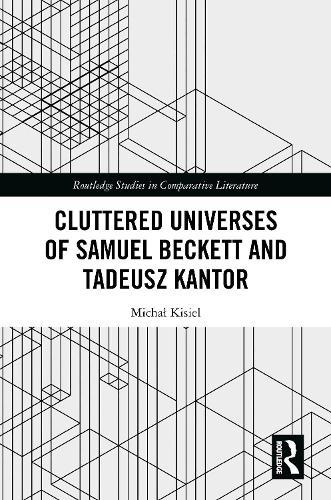Overview
Cluttered Universes of Samuel Beckett and Tadeusz Kantor is a collection of four essays bringing Kantor’s and Beckett’s texts, theatres, and theories into conversation with deconstruction, new materialism, environmental humanities, and posthumanism. This book is dedicated to two artists rarely discussed together to see how their awareness of poetics and performativity of matter might help us understand our connection to the material world, even if the world is falling apart. Jane Bennett, Karen Barad, Rosi Braidotti, Donna Haraway, Timothy Morton, and others pave the way for new critical interpretations of canonical works, which are recognised as universes “cluttered” with matter, objects, things, and other nonhuman visitors of seemingly exclusive human domains. Kisiel shows that Beckett’s and Kantor’s carefulness and care for imagining nonhuman/human relationships might refresh our understanding of memory, togetherness, death, or even the end of the world for the Anthropocene.
Full Product Details
Author: Michał Kisiel
Publisher: Taylor & Francis Ltd
Imprint: Routledge
Weight: 0.480kg
ISBN: 9781041038351
ISBN 10: 1041038356
Pages: 164
Publication Date: 08 August 2025
Audience:
College/higher education
,
Tertiary & Higher Education
Format: Hardback
Publisher's Status: Active
Availability: Not yet available

This item is yet to be released. You can pre-order this item and we will dispatch it to you upon its release.
Reviews
Kisiel’s comparative study, or as he phrases it, “possible trajectories,” is long overdue and especially useful given Beckett’s popularity and performance frequency in Poland--as far back as 1957 at Teatr Współczesny in Warsaw, directed by Jerzy Kreczmar during the Soviet occupation. Kisiel then offers an “original perspective” to the subject from a bilingual author well positioned to analyse both major authors and theatrical innovators, especially examining what Kisiel calls Beckett and Kantor’s “cluttered universe” and more, the “need for literary and environmental cartographies in the Anthropocene.” His theoretical perspective is quite “leading edge,” for instance: “The overall theoretical corpus is based on the developments in new materialism with regard to its deconstructive and Deleuzian roots.” This study resonates well beyond what might be considered the narrow confines of Polish theatre. --S. E. Gontarski, Robert O. Lawton University Distinguished Professor, Florida State University, USA Cluttered Universes of Samuel Beckett and Tadeusz Kantor is an engaging and thought-provoking book. Kisiel guides the reader deftly through the complexities of new materialist debates, focusing on materiality, embodiment, and the nonhuman before using this lens to examine the works of Samuel Beckett and Tadeusz Kantor. The result is a compelling and theoretically rich contribution to both Beckett and Kantor studies, but also to the broader fields of new materialism and Anthropocene scholarship. Kisiel’s readings of embodiment, temporality, and nonhuman agency in Beckett and Kantor are nuanced, creative and intellectually rigorous. His framing of “cluttering” as both an aesthetic and conceptual force – aligned with Karen Barad’s and Timothy Morton’s ideas of coexistence, diffraction, and weird intimacy – interweaves materialist thought with artistic practice. By affirming fragility and imperfection, Kisiel unveils how Beckett and Kantor dismantle the subject/object binary and offer new ways to engage with the nonhuman. Despite their androcentric limitations, their works reveal vibrant material agencies and temporal disruptions that prefigure ecological and epistemological shifts. Ultimately, Kisiel suggests that it is only by embracing failure, vulnerability, and openness to the nonhuman, that can we reimagine our place in a shared, entangled world – one shaped not by mastery, but by relationality and transformation. Cluttered Universes is a timely study that addresses contemporary ecological concerns and post-anthropocentric theory while casting fresh light on the work of two great twentieth-century authors. Clare Wallace, Associate Professor of English and American Literatures, Charles University, Czech Republic
Kisiel’s comparative study, or as he phrases it, “possible trajectories,” is long overdue and especially useful given Beckett’s popularity and performance frequency in Poland--as far back as 1957 at Teatr Współczesny in Warsaw, directed by Jerzy Kreczmar during the Soviet occupation. Kisiel then offers an “original perspective” to the subject from a bilingual author well positioned to analyse both major authors and theatrical innovators, especially examining what Kisiel calls Beckett and Kantor’s “cluttered universe” and more, the “need for literary and environmental cartographies in the Anthropocene.” His theoretical perspective is quite “leading edge,” for instance: “The overall theoretical corpus is based on the developments in new materialism with regard to its deconstructive and Deleuzian roots.” This study resonates well beyond what might be considered the narrow confines of Polish theatre. --S. E. Gontarski, Robert O. Lawton University Distinguished Professor, Florida State University, USA
Author Information
Michał Kisiel is a literary scholar, translator, editor, and assistant professor at Jan Dlugosz University in Czestochowa, Poland. In 2019, he received his PhD in literary studies. He has published in Journal of Beckett Studies, Samuel Beckett Today/Aujourd’hui, ER(R)GO, Zoophilologica, and Review of International American Studies, among other places. He is an editorial team member of ER(R)GO: Theory – Literature – Culture and a member of the Polish Academy of Sciences Commission on Literary History (Katowice Branch). His academic interests include experimental literature, deconstruction, materialist theories of the nonhuman, contemporary poetry, theatre and drama, and environmental humanities.



